Asteroid-World Spring 1990
Zip Dobyns
Eastern Europe continues to be the place where there is hope in spite of the almost insurmountable challenges which the people face as they switch from a system which promises security (though at a very low economic level) to a system which offers freedom (including the freedom to be homeless and hungry). In a world with a dozen or more civil wars occurring continuously or intermittently, the “peace” dividend remains elusive, yet there are some bits of light in our belligerent world. There is not much light in India and Pakistan which have escalated their confrontation. In fact, some voices are whispering about the danger of a nuclear exchange. India has had an atomic bomb for some time, and Pakistan is persistently rumored to be working on one. But it is hard to imagine any country being crazy enough to unleash the nuclear genie. I wonder which way the prevailing winds blow from that part of the world?
In the Near East, Israel and the Palestinians seem as far from any compromise as ever, and Lebanon lives in a state of crisis. Two hostages were released but many remain. At least the war between the Christian factions is no longer front page news. Parts of Africa are starving again, but South Africa has made some dramatic moves toward easing the gulf of apartheid. In South America, the struggle between the drug lords and the government of Columbia continues and the government of Peru is also fighting for its life against the threat of economic collapse and against the “shining path” revolutionaries who sometimes cooperate with the coca growers. Even two of the world’s richest countries in terms of natural resources, Argentina and Brazil, are edging toward bankruptcy or civilian revolution due to economic crisis. And our U.S. Congress has still not managed to provide the needed economic aid to Panama and Nicaragua whose economies were devastated by our blockades and military actions, direct in the case of Panama, mostly surrogate (through the Contras) in the case of Nicaragua.
At home in the U.S., we got through April 1990 with only a couple of sizable earthquake aftershocks for the San Francisco area. I breathed a sigh of relief since there were some really nasty patterns and astrologers face a real ethical issue on whether or not to warn people. Some day I hope we learn enough to be able to predict quakes. On the economic front, while experts now talk of a 500 billion price tag on the savings and loan bailout and the U.S. deficit makes a mockery of Gramm-Rudman, stock prices rise and the DOW Jones Industrial average hits a new high, over 2900 (from which it has retreated a little). If anyone from another planet is really watching us, they must be convinced that humans are insane.
Is it a positive development that another woman may join the ranks of female leaders? Except for Margaret Thatcher in England Prime Minister Gro Harlem Brundtland in Norway, and the former Prime Minister of Israel, Golda Meier, most other women leaders have been elevated to power positions largely because they were the wives or daughters of former, (often martyred) leaders. These women live in very male-dominated cultures, and perhaps the only way to ease the power struggles of the macho males is to have a “mother” figure to try to smooth the greedy or touchy egos. (Of course there are plenty of females who are both greedy and touchy: witness Imelda Marcos). Past or current women in power positions include Indira Gandhi and Benazir Bhutto who rode their fathers’ coattails, and Corazon Aquino and Violeta Chamorro who followed leading husbands. The latest similar development is the victory of Aung San Suu Kyi in Myanmar (formerly Burma). Her father was the slain hero of Burmese independence in 1948. Though the ruthless generals who have run the country allowed the election, they also kept Aung San Suu Kyi under house arrest, and, like Pinochet in Chile, it is far from certain that the generals will actually relinquish their power. They have been almost as destructive of their people as the terrible Pol Pot of Cambodia.
In the last few days, just before this issue of Asteroid-World is being written, Gorbachev has been in the headlines as he met with Bush in Washington, DC and briefly visited Canada, Minneapolis, and California. He is greeted as a hero and star everywhere outside his homeland, but he returns home where he has moved from being the most popular man in the country to the most unpopular. The U.S.S.R. has lived under communism since 1917, and recent polls suggest that a majority of its citizens prefer living on a very low but equalitarian and protected standard of living to risking unemployment, loss of security, and having to work harder. In the present state of crisis, they have the worst of both systems as the state planning machinery and the entrepreneurs collide. The small minority who are willing to risk long hours and hard work hoping to eventually improve their lives are typically met with hostility by the majority who have been firmly indoctrinated with the belief that wealth is evil, a sin against the people. What is it about humans that leads to these extreme dogmatisms? I will not repeat my philosophical musings which were included in the summer 1989 issue of Asteroid-World that was mostly devoted to the situation in China after Tiananmen Square, but just remind readers that Aquarius, the sign being approached by three of our outer planets which are now in Capricorn, seeks both equality and individual freedom yet carrying either one to an extreme destroys the other. Maximum freedom leads to maximum inequality. Maximum equality and security can only be achieved by giving up freedom. Moderation is still the wisest course. When a living being becomes too hot or too cold, life is destroyed. In the middle is a zone in which life is possible.
I have written about Gorbachev’s chart in the past, and we still do not have a firm time or longitude or latitude for him. However, a new biography, (a condensed version will be the first to be published in the U.S.S.R.), confirms that his birthplace is in the Krasnogvardeyskoe region. I used a slight variant on the spelling, but my latitude and longitude should be close to accurate. The time remains uncertain since I have still not heard directly from Farida about the source of her birth time and the amount it was changed or even who did the rectification. Regardless of the birth time, the year-long Saturn return remains. Transiting Saturn stays within two degrees of either natal or progressed Saturn from mid-January 1990 to the end of December 1990. Saturn marks times when we get report cards from life on how we are doing. It is associated with both the achievement of power and a fall from power if the person has overreached. Gorbachev has achieved greater power than anyone since Stalin. He took the oath of office as President of the Soviet Union on March 15, 1990, and I hope we will be able to get the time eventually. The power of the office of President had been vastly expanded, but Gorbachev also has been challenged in ways that would not have been permitted in the past before he allowed and encouraged perestroika and glasnost. Still, his glasnost (openness) has its limits. Gorbachev was recently booed in public by thousands of citizens following the traditional May Day parade designed to honor socialism, and he left the podium on top of Lenin’s tomb in a state of visible irritation. He also got a new law passed which turns “indecent” insults of the president into a crime that could lead to as much as six years in prison.
Gorbachev’s major current rival is Boris Yeltsin, who was born on February 1, 1931, just a few weeks before Gorbachev. His birth place is Sverdlovsk, U.S.S.R., but we do not have a birth time for him. Yeltsin was just elected President of the Russian Soviet Federated Socialist Republic which is by far the largest of the 12 republics, comprising the original territory of Russia plus Siberia. Yeltsin has already challenged Gorbachev by meeting with Landsbergis, the head of Lithuania, and by threatening to lead Russia to secede from the U.S.S.R. and to create their own laws. Under Stalin, Yeltsin would have simply disappeared unless Stalin decided to have a show trial and forced him to confess to crimes against the state. Later Russian dictators would have probably exiled him to Siberia. Though Yeltsin seems to be going head-to-head against Gorbachev, it is possible that he could also be helping him since at this time, he is the only possible replacement for Gorbachev as leader of the country, and the conservatives are likely to cling to Gorbachev as the lesser of two evils. Yeltsin may thus be Gorbachev’s insurance against a revolt by a combination of conservatives including the military, the KGB, and the Communist Party Bureaucracy.
Yeltsin has a full grand cross in cardinal signs including Uranus and the north lunar node in Aries, Jupiter, Moon and Pluto in Cancer, Ceres and the south node in Libra, and Mercury and Saturn in Capricorn. His Leo Mars is widely opposite the Sun in Aquarius and both square Chiron in Taurus for a fixed T-square. The combination of conflict aspects involving cardinal and fixed planets, signs, and/or houses is a strong indication of a power struggle life. Of course there are healthy and unhealthy ways to struggle. Yeltsin clearly relishes his political struggles as he tries to push Russia toward a western-style system more rapidly than Gorbachev (and maybe the country) can handle. Yeltsin also has many trines, including a grand trine in earth signs and almost a grand trine in fire signs. The fire-earth emphasis marks a “steam-roller” who often charges in where “angels fear to tread,” as the old saw has it. Most of his planets are between 11 and 19 degrees, forming a powerful set of aspects to each other. I suspect that he was born about mid-afternoon with his Moon closely conjunct Pluto. A mid- to late afternoon time would also put his P Moon (for his election as President of the Russian Republic) into a quincunx to P Mercury and a trioctile to natal Sun. A time late in the day would also bring his P Sun to a conjunction with natal Uranus which fits his approaching fireworks with Gorbachev. P Jupiter also opposes P Vesta and both are square Uranus and P Sun to further accentuate the power struggle as the U.S.S.R. tries to evolve from a totalitarian empire into a true federation of republics that can live comfortably with the rest of the industrialized world. One additional key to the major changes in Yeltsin’s life this year is his P Pluto making a station to go direct. When progressed planets change from retrograde to direct or vice versa, it usually marks a period of change in the part of life symbolized by the planet, colored of course by its sign and house positions.
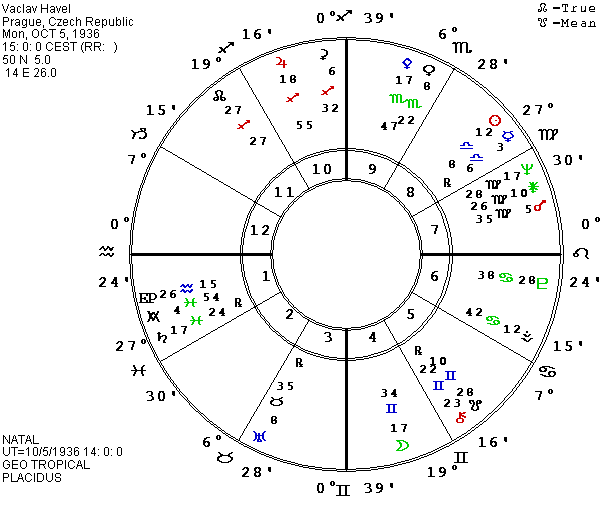
Moving to a leader for whom we now have a birth time thanks to Lois Rodden, Vaclav Havel, who was inaugurated as President of Czechoslovakia on December 29, 1989, was born on October 5, 1936, at 3 P.M. in Prague. UT was one hour earlier. Havel is known as a playwright and poet and a lifelong rebel against communist dictatorship. His horoscope is certainly appropriate, with 0 Sagittarius on the MC and 0 Aquarius rising plus a close grand cross in mutable signs and cardinal houses. The mutable parts of life are all mental, marking the “head” person who may be a perpetual student, writer, teacher, traveler, etc. The cardinal (also called angular) houses show the potential for power struggles in the world, especially since Havel has Mars in the seventh house and Pluto on the cusp though it is just inside the sixth house. But Havel is not really a politician, and has said that he does not want to continue in a power position. He is there currently because people trust him. The June 11, 1990 issue of U.S. News & World Report describes the aftermath of Czechoslovakia’s “velvet revolution” in its own poetic terms. They write that in the work places, absenteeism is soaring and productivity is falling, but that the people in power are more engaged in debate than in action. One academic commenting on Havel said that “We know that he is honest and courageous. .... Given the moral decay in this country, it is sufficient that our President is open, approachable and decent.” A close colleague describes Havel as “a creative artist who doesn’t want to be tied to existing paradigms of social issues.” The managing editor of a formerly underground newspaper says “There are a lot of daydreamers in this government. They’re full of good will but have no idea how to get the garbage collectors to work.” Even Havel’s wife fits the picture. She leads a group devoted to curbing selfishness.
Have you ever heard a better description of one version of the mutable dilemma? A basic mutable issue involves our ethics which are based on our belief systems, symbolized by letters nine and twelve in our astrological alphabet. In Havel’s chart, P Neptune in Virgo in the seventh house holds a long square to Jupiter in its own sign of Sagittarius and overlapping the tenth-eleventh house cusp. This is a typical pattern for conflict between one’s ideals and what is possible in the world, including what we can expect of people. Just as his people trust him, despite his lack of practical experience, Havel may often trust other people too much and be disillusioned. But he has been an inspiration to many people in many countries, both by his example and by his poetic talks. Havel’s rising Saturn in Pisces which was exactly opposite Neptune for many years (though no longer in the one-degree orb) repeats the tension between ideals and what is possible, between living in the head and coping with the material world. We can’t all be artists, poets, musicians, visionaries all of the time. We can all do these creative activities some of the time if we are also willing to weed the garden, run the machines, balance the accounts, and handle the garbage.
I calculated Havel’s horoscope for Moscow as well as for his birthplace in Prague, since the revolution was only possible because of Gorbachev’s change in the U.S.S.R. It is fascinating that Havel’s P Sun was just entering his tenth house (showing his potential for executive power) when Gorbachev came to power in March 1985. Havel’s P Sun had reached a square to his Moscow Ascendant and his natal Mars (which is on his Descendant in Moscow along with Bohemia, a geographic region within the country) when he became President of Czechoslovakia. That local Ascendant at five Pisces is also conjunct the asteroid Russia in the chart for Russia’s November 1917 revolution. As usual, there are many interesting asteroids in Havel’s chart. Both natal and P Michel (equivalent to Mikhail) are conjunct P south lunar node and Havel’s P local Ascendant is on the natal south node. There must be some mutual learning going on between the two men. P Moskva (Moscow) is conjunct Vesta in Havel’s sixth house, pointing to the dramatic effect which Moscow has had on his work. Natal Slovakia, an asteroid named for one of the main cultural groups which make up the country, is on Havel’s natal Mercury, and P Slovakia is sextile-trine the P nodes of the Moon. P Sun was just coming to the opposition to natal Czechoslovakia when Havel was inaugurated, and P Czechoslovakia was sextile Pluto and quincunx P Jupiter (MC ruler), forming a yod. Career changes involving the country were certainly suggested.
Other aspects include P Praha (named for Prague) conjunct P Europa with both quincunx P Chiron and all three aspecting Havel’s Moscow MC as the country moves toward closer relationships with Europe. P Chiron has been conjunct Havel’s local IC for almost all of his life, connecting his faith, his homeland, and the power situation in Moscow. P Jupiter’s long quincunx to the sixth house Pluto is another clue to work changes and its sextile to Masaryk connects Havel’s faith to one of the founders of Czechoslovakian independence between the two world wars. P Masaryk is also semisextile natal Jupiter to repeat the message. P America just started a conjunction with natal Jupiter, indicating an association between faith and America. I hope that we do not let the country down. A little more ominous is P Mars approaching a conjunction to P Atlantis in the eighth house with both quincunx Uranus in Taurus. That combination suggests tension and possible struggles ahead, probably involving joint finances and property. Natal Russia is sextile-trine Havel’s nodes of the Moon and just past a trine to the East Point so it fills in a grand air trine. P Russia squares the East Point but when one moves from a natal to a progressed aspect, the results often fit the nature of the natal aspect while the current pattern shows the timing. As the people of Czechoslovakia vote in their first truly free election since the country was overrun by Hitler in 1937, Havel’s P Moon will be crossing his P Czechoslovakia, sextile Pluto, and quincunx P Jupiter, activating his yod, then moving into his fourth house. It looks like more changes ahead, for him personally or for his country. As is the case with many of the countries which were formerly under communist domination, ethnic issues have surfaced once the totalitarian grip was loosened. In Czechoslovakia, the tension is between the Czechs and the Slovaks. Some leaders are pushing for separation while others are urging compromise and cooperation. They may need the verbal persuasive ability of Vaclav Havel.
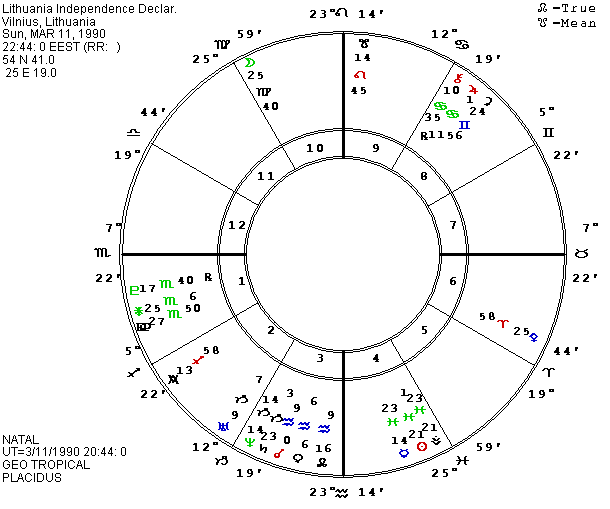
In the interval since I reported a tentative chart for Lithuania set for the time the news of their declaration of independence reached Washington, DC, I have learned the actual time of the declaration. It was published in Vilnius with banner headlines: March 11, 1990 at 22:44, two hours from UT. The chart features a full moon, with the Moon on the cusp of the eleventh house at 25 Virgo and a Sun-Vesta conjunction at 21 Pisces. Ceres in Gemini in the eighth house forms a T-square to the Sun and Moon. Scorpio is rising with Pluto trine Mercury in Pisces and Juno and East Point also in Scorpio trine the Sun-Vesta. Chiron just inside the eighth house in Cancer forms a grand water trine to Pluto and Mercury, suggesting that the people will be helped by others, but so far the economic pressure imposed by Gorbachev’s blockades far outweighs any help received from the other Baltic republics, Poland, or other countries. As mentioned above, Yeltsin has just opened a dialogue which may force the hand of Gorbachev. The independence chart is presented in Asteroid-World with geocentric positions in the center circle and heliocentric positions in the outer circle. The Ascendant is closely square Venus, fitting the financial pressures, and it is also octile-trioctile the Sun-Moon opposition. The MC is exactly quincunx Saturn, the natural ruler, an appropriate aspect for the change in the handling of executive power and the potential for power struggles. But Saturn also trines the Moon and is sextile Sun-Vesta so I think that things will work out in the end. Gorbachev’s policies will backfire in the end since he is forcing the republic to become more autonomous as well as increasing the cooperation between the three Baltic states. The internecine friction within the U.S.S.R. has been increasing as republics and cities have started keeping their scarce supplies for their own people, but once such a process starts, it is hard to reverse it and return to cooperation. And a country cannot survive if its parts cannot work together.
One of the fascinating discoveries which I made when working on an article for the Heliocentric Special Interest Group (SIG) of NCGR was that the heliocentric positions of asteroids Vilnius and Moskva were simultaneously conjunct the MCs (and 12 hours later the ICs) in the cities for which the asteroids were named. Since the earth rotates once in 24 hours, these simultaneous conjunctions on the angles occurred once daily as long as the two asteroids maintained an angular distance which was approximately the same as the longitude difference between the two cities. The conjunctions were present through the time that the Lithuanians were campaigning, electing their Parliament, and finally voting for independence from the U.S.S.R. Mark was able to use his FAR computer program to determine how often this angular distance occurred when Moskva stayed about 12 degrees ahead of Vilnius in the zodiac. We discovered that it lasts for a few months at intervals of about 20 years, occurring in 1911, 1931, 1951, 1970, and 1990. Altogether, the two asteroids held the proper relative positions in the zodiac for about 241 days between 1900 and 2000, or .0066% of the time. What kind of statistical odds are we looking at when we have the pattern during the time that the people of the country (symbolized by the IC) are dealing with their bureaucratic rulers (represented by the MC), and deciding to change the ruling system and the identity of the people, to become an independent state?
Many other asteroids might be mentioned for Lithuania, but I want to also mention the coming “day of decision” for our neighbor to the north. Ethnic and national issues are not limited to Eastern Europe. They are increasingly present in the U.S. as racial tensions build, and in our neighboring country which has mostly seemed so stable and tolerant. Quebec, one of the provinces of Canada, was originally settled by the French and in many ways it has maintained its French culture in contrast to the rest of Canada which is English-speaking. Some years ago, Quebec considered separating from the rest of Canada to become an independent country, but the action was eventually defeated by the voters. Quebec is again threatening to “go it alone,” and this time it might happen. The economy of the province has improved in recent years, and there is increasing confidence that they could survive alone. Additions to the 1982 constitution were drafted under the direction of Prime Minister Mulroney and signed on June 3, 1987. This Meech Lake agreement specifies Quebec’s right to remain a “distinct society” and the legislatures of all ten provinces have to sign it by June 23, 1990. So far, three provinces have refused to sign it and Mulroney is working to persuade them but there has been a considerable backlash in English-speaking Canada against the recent Quebec laws forbidding the use of English in schools and public buildings.
If Quebec does decide to separate, it would be done without violence but the repercussions would be major and hard to predict. The three eastern provinces of Canada would be cut off from the rest of the country, and some have suggested that they might apply to join the U.S.A. Since they are all fairly poor, the U.S. might not be eager to permit this. British Columbia on the Pacific coast has also talked of joining the U.S. but a majority of Canadians are likely to reject such a prospect. They mostly prefer their own government which has more social benefits such as universal health care and low-priced government insurance. Ontario which is just west of Quebec is the most industrialized and the wealthiest of the provinces. The other provinces depend largely on natural resources. It is really impossible to guess what might happen if Quebec does really decide to separate from the rest of Canada.
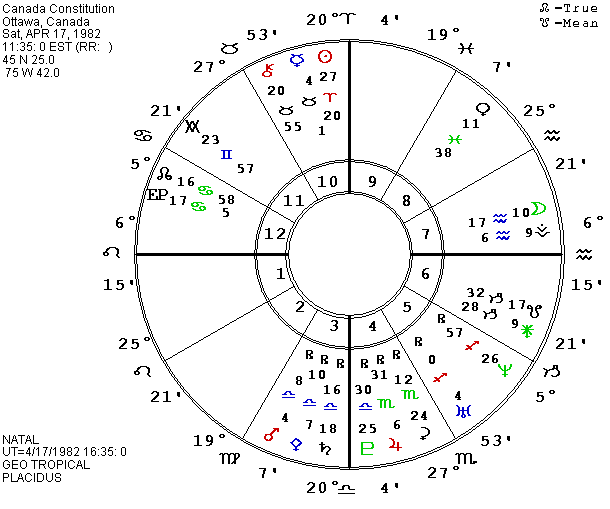
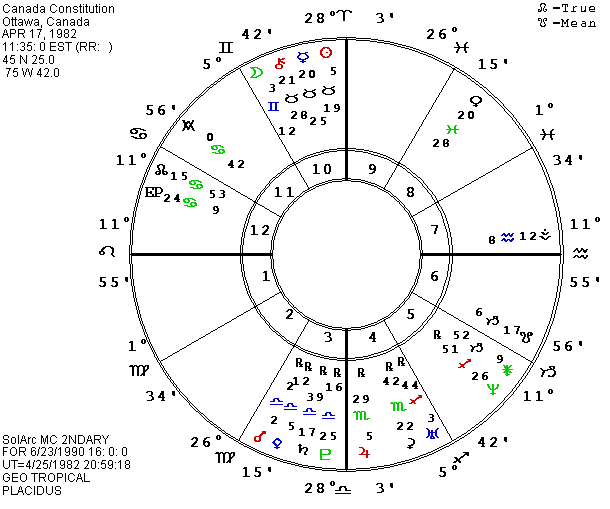
We have two charts for Canada, both from The Book of World Horoscopes by Nicholas Campion. Canada became independent from Great Britain on July 1, 1867 at 0 A.M., LMT. The charts would be calculated for Ottawa, the capital of the country. On April 17, 1982, at 11:35 A.M. EST in Ottawa, Queen Elizabeth of Great Britain signed a new Canadian Constitution. The chart for the Constitution shows the most dramatic change at the present time, suggesting that a constitutional change is more likely than a major breakup of the country. This implies that the Meech Lake agreement will produce some kind of action, even if it is not signed in its present form. In the 1982 Constitution chart, P Sun is opposite P Jupiter across the tenth and fourth houses which fits a change in the government structure that affects the land or the people. At the deadline for agreement, June 23, 1990, P Moon is opposite natal and P Uranus, again suggesting possible dramatic events for the people, including rebellion. P MC was opposite Pluto when the Meech Lake agreement was signed, pointing to the potential for power struggles over the action, and P Pluto remains opposite the MC in Quebec for well over 100 years. P East Point will start a square to P Pluto by early August, 1990. P Antivertex is approaching a square to P Mars. P Ascendant opposes P Vesta across the first and seventh houses, another indication of possible power struggles and separation, and it is also trioctile Neptune which can indicate tension between ideals and personal action. Often, this aspect just means that we want more than we can have. P Mercury on Chiron is appropriate for thinking and talking about legal matters if you accept Chiron as similar to Jupiter. The chart certainly points to immanent change.
There are also many appropriate asteroids in the Constitution chart. P Elizabeth is on Mercury, the P MC in Quebec, and P Gallia (France). It is also semisextile P Moon, and quincunx Mars and Uranus to form a yod. The combination certainly supports change. Remember it was Queen Elizabeth’s signature that marked the legal beginning of the constitution as the law of the land. In addition to its long opposition to the MC in Quebec which suggests the power issue will be a long-term festering source of tension, P Pluto stays quincunx Lutetia, the original name of Paris. The asteroid Paris was in Leo in the first house and retrograde in 1982. It is now direct but still within minutes of its natal position in an octile to Mars. P French and P Daedalus are both conjunct P Sun and opposite Jupiter. Daedalus was the “wheeler-dealer” who built the labyrinth in Crete and the model of a cow that let Minos’s queen make out with the sacred bull, among other escapades in a very eventful life. He flew to safety but his son, Icarus, crashed. In addition to the French role in the situation, the Catholic Church is a less visible player in the confrontation between two cultures. P Vaticana will start a square to Paris and a quincunx to P Saturn before the end of 1990, but its current aspects are harmonious, trine the south lunar node and sextile the north node and the East Point.
The U.S. is also in the picture as P north lunar node holds a conjunction to America for many years and P Pluto holds a square to Herbert. P Herbert is square the natal Sun for a shorter period of time. P Washington is conjunct Pallas, our most political asteroid, and also opposite P Urania in the ninth house, appropriate for legal changes involving other countries.
P Toronto, named for a large and prosperous city in Ontario, is in a grand trine to Pluto, Union, and P Icarus. It will soon leave a quincunx to Ceres, but for some years P Ceres will hold a quincunx to natal Toronto in Gemini in the eleventh house. P Toronto has mixed aspects to the angles in Quebec; a sextile to the local MC and an octile to the local Ascendant as well as a trioctile to natal Moon which is exactly opposite the Quebec Ascendant. The two water planets exactly on the Quebec angles with Neptune, the third water planet, moving toward a trioctile to the local Ascendant certainly fit the emotionalism which is rampant in Quebec.
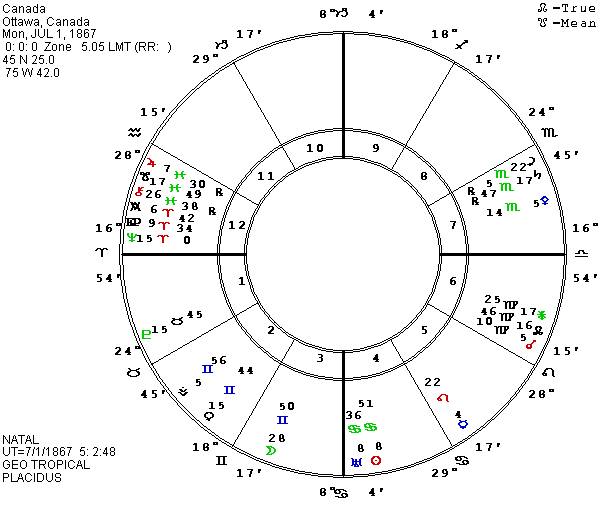
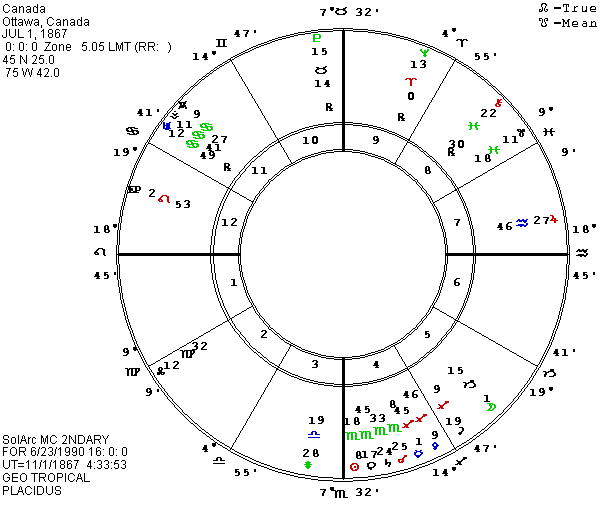
Turning to Canada’s Independence chart, we can see some aspects suggesting change but they are less numerous and less dramatic than in the Constitution chart. P Vesta in the fourth house is approaching P Uranus, having already passed natal Sun-Uranus. The house and the sign of Cancer suggest status changes for the public and/or the land, but a trine from P Sun in the seventh house to natal Sun-Uranus looks like the potential for compromise in relationships. P MC stays in a lifetime opposition to P Sun but it is just about to start a sextile to natal Sun-Uranus and it is already sextile Jupiter. P Venus on Saturn in the seventh house can show a need to be practical in relationships but its sextile-trine to the nodes and Juno should indicate the ability to work things out. P Mars is conjunct P Saturn and both are on the eighth house cusp, repeating the need to compromise in the handling of power. P Mercury is trioctile the natal Ascendant, fitting the vigorous debates which are underway. Among the long-term aspects, the P Uranus square to P Neptune is especially important since P Uranus is on the IC when the chart is calculated for Quebec, and P Neptune is square that local MC. The combination is a clear statement of the chronic rebellion by the people of Quebec as the bureaucratic structure conflicts with their ideals.
And now we have our contribution from Seraphita on the sources of asteroid names. [Not in the web archives.]